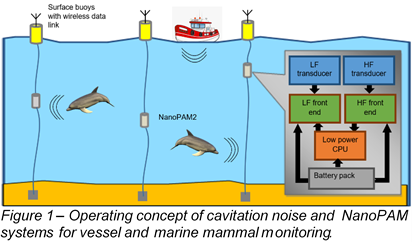

Research projects

- Research area
Environmental impact marine biology and aquaculture
- Institution
Newcastle University
- Research project
Application of novel sensors to assess vessel, porpoise & dolphin activity during development of a floating wind farm off Blyth, UK
- Lead supervisor
Professor Jeff Neasham (Newcastle University)
- PhD Student
- Supervisory Team
Professor Per Berggren (Senior Lecturer – School of Natural & Environmental Sciences, Newcastle University)
Project Description:
The Project
Echolocating marine animals (toothed whales e.g. dolphins and porpoises) use sound to navigate, forage and communicate (Yang et al. 2021). The sounds and related activities may be interrupted by presence and noise from human activities including vessel and offshore construction (Temple et al. 2019). This may lead to animals leaving an area or lowering their foraging and reproduction success and ultimately causing negative effect for individual and population fitness.
This project will further develop, test, validate and use novel passive acoustic sensors (developed at Newcastle University by the supervisory team) to identify and assess vessel activity using a cavitation noise sensor platform (Lowes et al. 2019) and porpoise and dolphin occurrence, and behaviour using an echolocation sensor platform – NanoPAM (Berggren et al. 2019). The two platforms are small, low-cost, low-energy passive acoustic monitoring systems, deployed near the seabed, that listens, analyse and send the resulting data back to the user on land via long-range wifi or Iridium satellite networks. The project will build on the testing and developments of the NanoPAM system by a currently Aura funded student. This project will deploy multiple cavitation and upgraded NanoPAM sensors to cover the area off Blyth, UK, and monitor vessel, porpoise and dolphin activity before, during and after the construction of the planned Blyth floating wind farm to be commissioned by 2025.
This project will further develop, test, validate and use available hard- and software prototypes for the vessel cavitation monitoring system and a passive acoustic system for monitoring occurrence and behaviour of dolphins and porpoises. Identification and validation of vessel cavitation data will be conducted by comparing detections to simultaneously collected vessel AIS data. This will allow classification of cavitation data to vessel type and possibly individual vessels and facilitate monitoring temporal and spatial vessel occurrence in the study area. The NanoPAM system allow passive acoustic monitoring of the occurrence and behaviour of echolocating cetaceans (dolphin and porpoises). The validation and performance of the NanoPAM system is the focus of a current AURA PhD student’s research and the two students will overlap in the 2nd year of the proposed project and then work in parallel.

The two systems will then be deployed in this PhD project to monitor vessel and animal occurrence and behaviour (Fig. 1) during the development of a floating wind farm off Blyth, UK. Data will be collected and analysed before, during and after the construction of the windfarm. The analyses will also collect and include environmental and construction related data in the analyses to allow evaluation of what drivers (e.g. environmental, construction related and vessel activity) that may affect dolphin and porpoise occurrence and behaviour.
The results will be important for planning future windfarm developments and will provide validated and tested methodologies to monitor vessel, porpoise and dolphin occurrence and behaviour.
PhD project Timeline
Year Key activities
1 Core CDT training at the University of Hull. Literature review in the PhD project area.
2 Test and validate cavitation and animal detection hard and software. Deploy sensors to collect pre-construction data in area of floating wind farm development.
3 Analyse pre-construction data. Collect and analyse during construction data.
4 Collect and analyse post-construction data and finish writing thesis.

